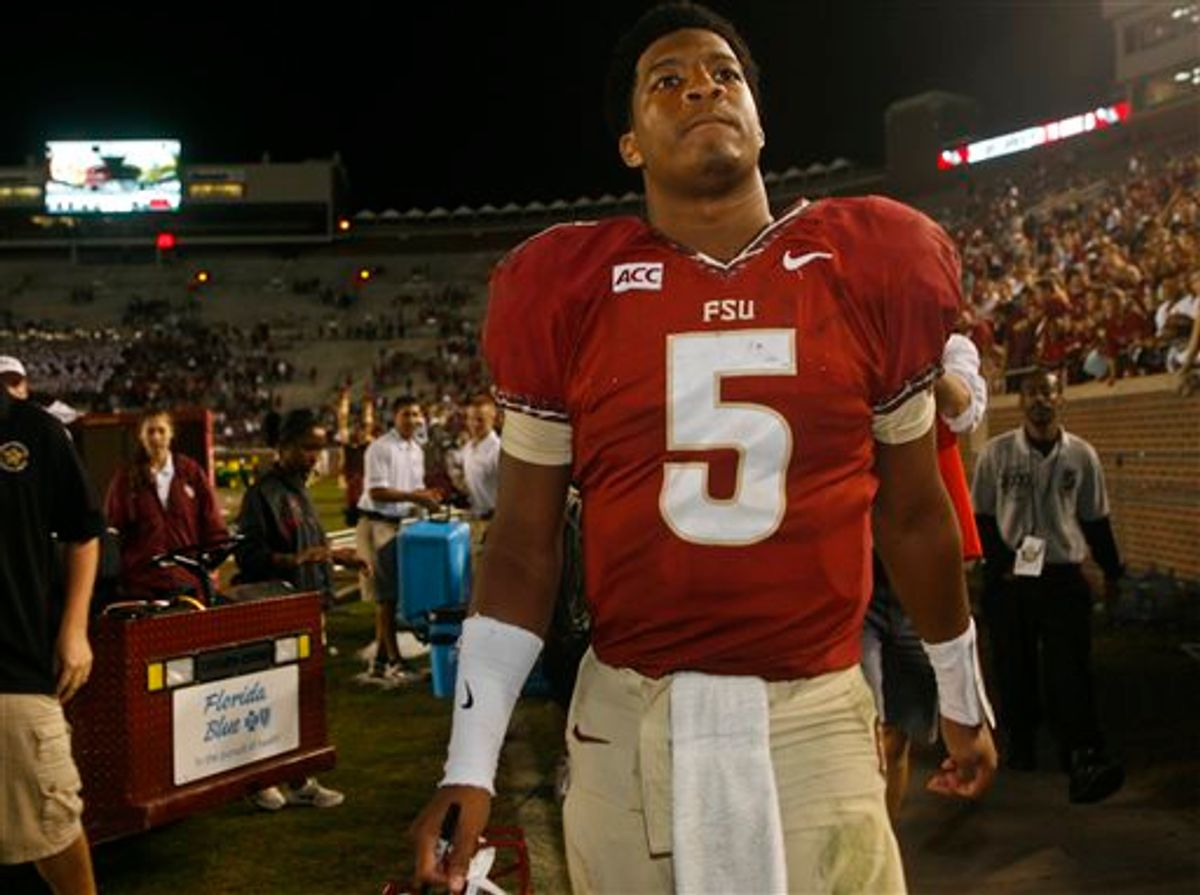The United States Department of Education's Office for Civil Rights (OCR) has launched an investigation to determine if Florida State University's handling of the Jameis Winston rape allegations violated Title IX laws, according to a statement from the university originally obtained by USA Today.
Winston, a quarterback for the Florida State Seminoles, is alleged to have raped a fellow student in December 2012. According to a report from Deadspin, school officials met with Winston in late January 2014 -- after football season ended -- to discuss the alleged incident. Winston's accuser did not know about the meeting until after it happened, according to her attorney.
"The important time periods are 13 months after the university knew about the assault, 12 months after they knew the identity of the suspect, more than two months after the whole world knew about the case and two weeks after Jameis Winston played in the national championship football game," said John Clune, one of two Title IX attorneys representing the woman.
At the meeting, Winston "basically took the fifth," according to a source who spoke to Deadspin. Winston refused to answer questions about whether or not he obtained consent on the night of the alleged assault or if he understood what alcohol impairment meant. According to Deadspin, "The administrators concluded that without Winston's cooperation there was insufficient evidence to support a finding of a Title IX violation at that time."
The victim of the alleged assault filed the complaint with the OCR in March -- shortly after state attorney Willie Meggs announced that Winston would not be charged with sexual battery, citing insufficient evidence to obtain a conviction.
The criminal investigation into the alleged rape was troubled from the start. Tallahassee police waited nearly a year before bringing the case to the attention of the state attorney's office, which determines if criminal charges will be filed. The lawyer representing Winston's accuser during the criminal investigation alleged that the Tallahassee police warned her not to pursue the case, and that she was told by a detective that her client’s life would be “made miserable” if she moved forward with the investigation. “Tallahassee was a big football town,” he is alleged to have told her. “The victim needs to think long and hard before proceeding against him because she will be raked over the coals and her life will be made miserable.”
As USA Today notes, Winston's DNA was found on the woman's clothing, but a DNA sample was not collected until 10 months after the woman identified him as her alleged rapist. Surveillance footage from the bar where Winston was with the woman and two of his teammates was never collected. A video of the alleged incident was deleted by one of Winston's teammates, and it's unclear if the police attempted to recover it.
After announcing that criminal charges would not be filed, Meggs criticized the school and the Tallahassee police department for a badly delayed and flawed investigation into the allegations. After the case closed, Winston resumed his life as a beloved football hero; he would go on to win the Heisman Trophy one week later.
Under Title IX, universities that receive federal funding are required to investigate sexual assault claims by taking "immediate action" to address the allegations according to established procedure. And according to the OCR, "Conduct may constitute unlawful sexual harassment under Title IX even if the police do not have sufficient evidence of a criminal violation. In addition, a criminal investigation into allegations of sexual violence does not relieve the school of its duty under Title IX to resolve complaints promptly and equitably."
Baine Kerr, the woman's other lawyer in the Title IX investigation, said his client is "particularly gratified by the OCR's decision to investigate and look for discrimination and find remedies to it. Her primary goal, from the beginning, has been affecting change that will make women at Florida State safer on campus.''

Shares